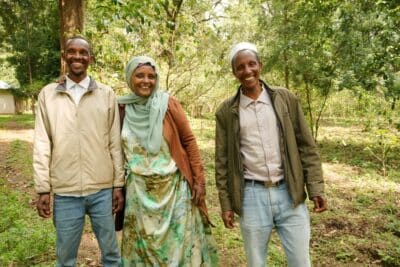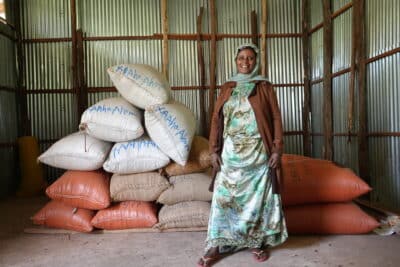Stories
Ethiopia
1 June 2022
Access to water in Berak kebele

Due to increasing water scarcity, the women of Berak kebele have been walking up to eight hours a day to source water. They reflect on how the newly constructed community pond will transform their lives.
Water scarcity is a challenge in the Bale Eco-region of Ethiopia. Deforestation in the highlands and erratic rainfall are putting pressure on the area’s already inaccessible water resources. In Berak kebele in Delo Mena woreda, families of six to seven people have to get by on just ten litres of water every two days.
“There were many incidents where pregnant mothers from our village gave birth on their trip to fetch water. Others were attacked by crocodiles, snakes and other wild animals."
Rabila Hussien
Resident of Berak kebele, Delo Mena woreda
The women of the neighbourhood face the brunt of this burden, having to make the long and arduous eight-hour round trip on foot to the main source of water. Aside from the distance, the journey also exposes them to harmful incidents. Rabila Hussien from Berak kebele, explains:
“There were many incidents where pregnant mothers from our village gave birth on their trip to fetch water. Others were attacked by crocodiles, snakes and other wild animals. We have been fetching water from Welmel river. The water is not clean. For this reason, our children have been suffering from diarrhoea and abdominal cramps. On the other hand, the spring water source has diminished.”

Other women from Rabila’s kebele and the surrounding neighbourhoods have encountered similar experiences: “Going on foot while carrying water jerry cans on your back under a scorching sun or on a rainy day makes you desperate. It leaves us with no energy for household chores that are waiting for us at home,” said Deko Adem, also from Berak kebele.
To address the community’s challenging access to water, Farm Africa has been constructing a community pond in the kebele. According to Rabila, when the pond fully opens it will supply water to more than 300 households in her kebele, as well as to other people in nearby neighbourhoods.

“Thanks to the project, now our women won’t waste their time and energy in search of water,” said Rabila. Agreeing with her neighbour Deko says, “I am glad it will only take us five to 15 minutes to get water when the pond starts service.”
Aside from providing local residents with water, the project aims to improve the health of the community’s livestock, and as a result agricultural productivity, by also supplying water to 15,000 cattle, goats and camels in Berak kebele, an area home to 140,000 hectares of grazing land.
Learn more about the Bale Eco-region Phase II project here.





